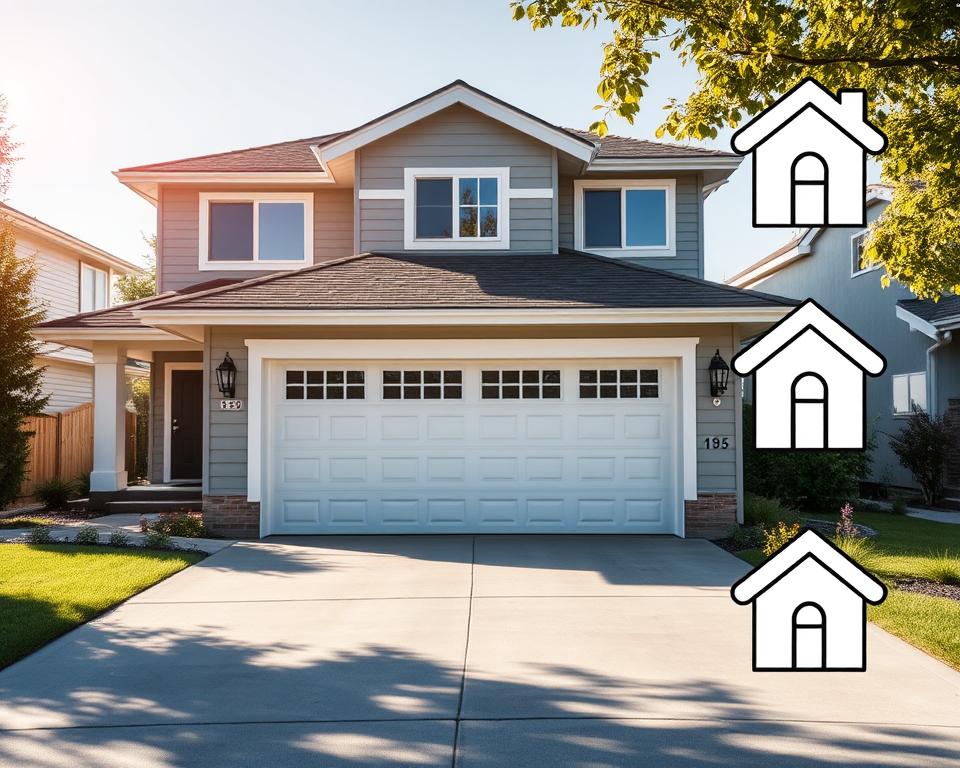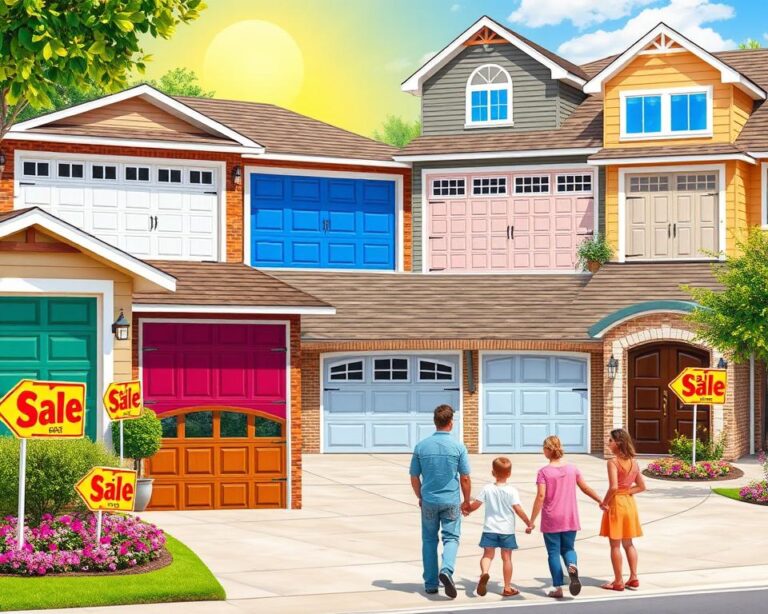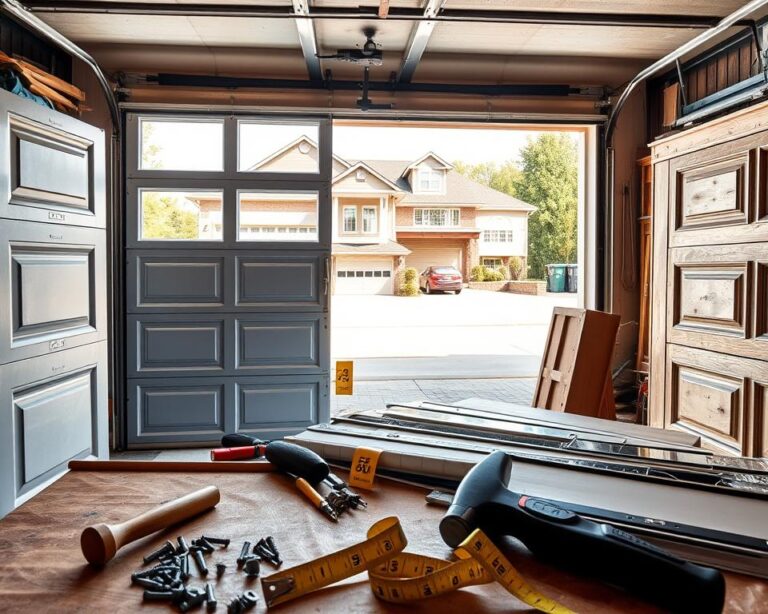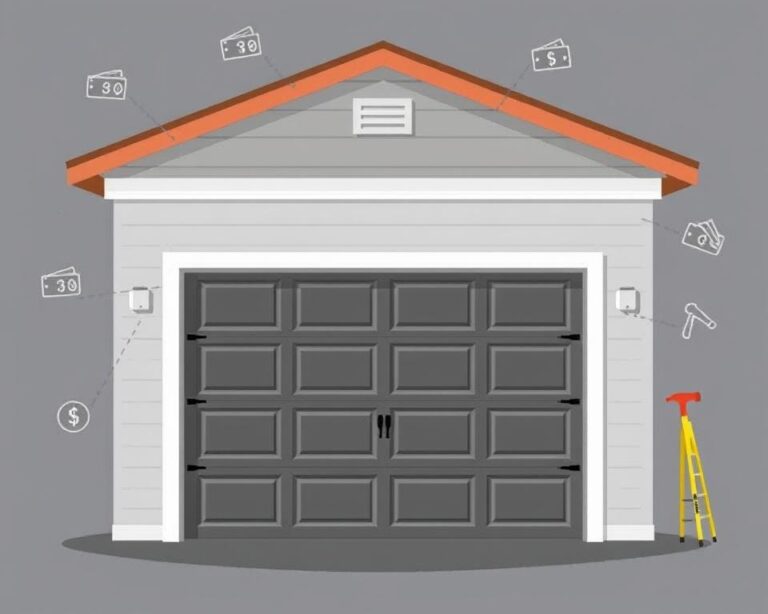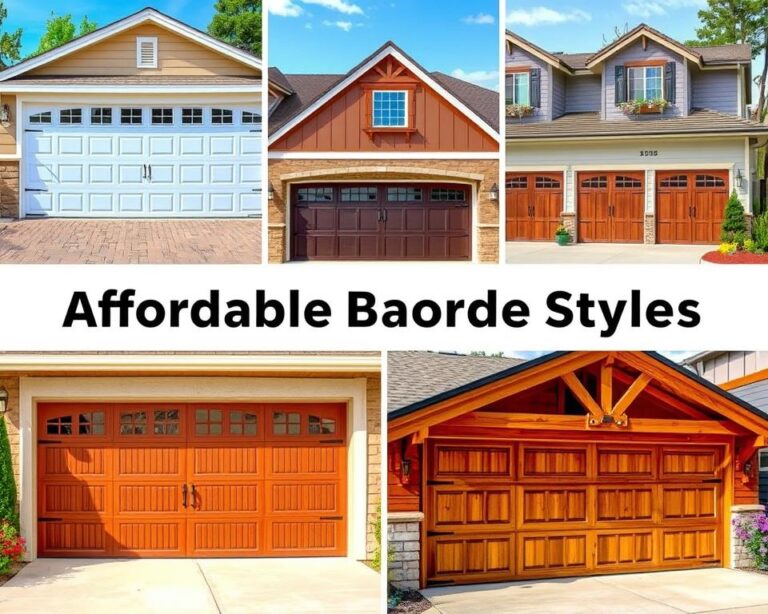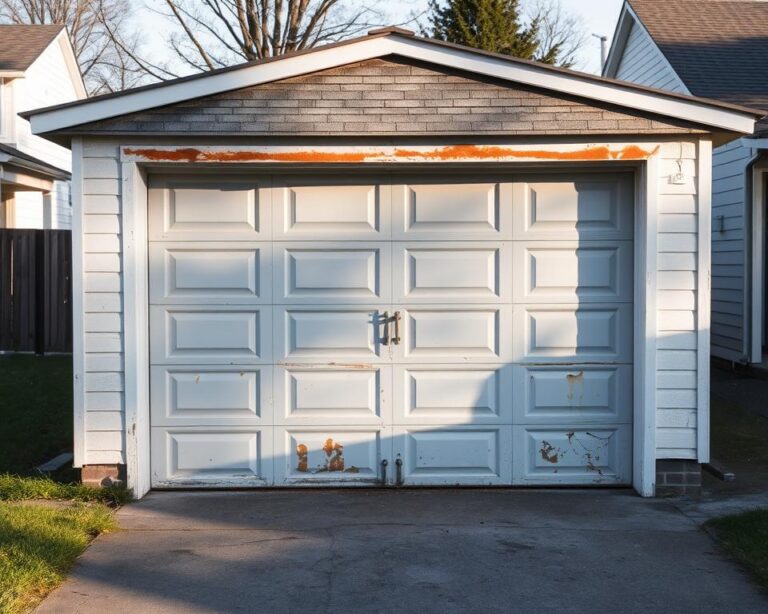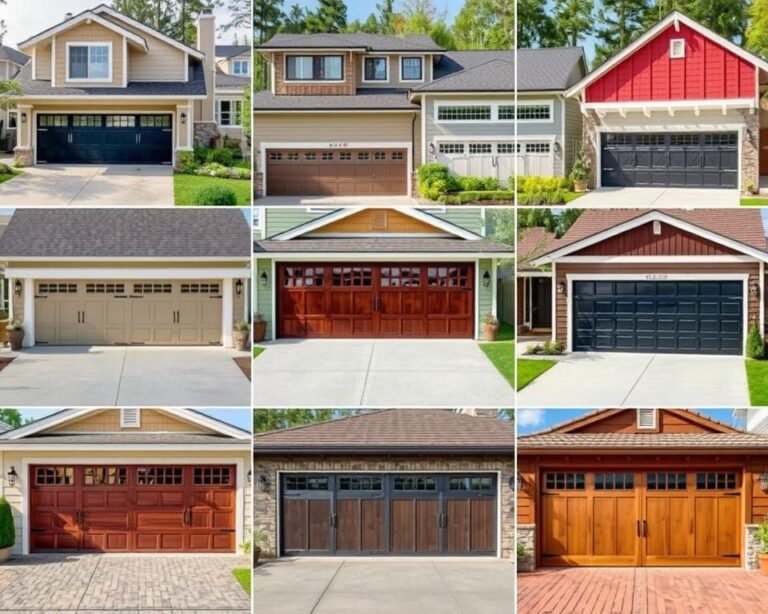Does Homeowners Insurance Cover Garage Doors?
Many of us wonder what our home insurance really covers. A big question is whether it includes garage doors. Knowing what’s covered is key for making smart choices about our policies.
Garage doors can get damaged in many ways, like car accidents or natural disasters. It’s important to understand what our insurance covers. This way, we can be ready for any unexpected damage.
Garage doors can wear out or get damaged in accidents. Luckily, home insurance often covers these damages. About 10% of garages get damaged by cars each year. Knowing what our insurance covers helps us prepare for surprises.
We’ll look into what home insurance covers for garage doors. Understanding our policies helps us stay protected. It also makes sure we get the most out of our insurance.
Understanding Garage Door Coverage in Your Home Insurance Policy
Exploring homeowners insurance, it’s key to know what’s covered for garage doors. Most policies cover garage door repairs for damage like car accidents, theft, vandalism, fire, and natural disasters.
When you file an insurance claim process, remember that property damage coverage often applies to garage doors. This coverage can help with repair or replacement costs, based on the damage.
Types of Coverage That Apply to Garage Doors
Several coverages might apply to garage doors, like dwelling, other structures, and personal property coverage. These can protect against damage from fire, windstorm, and theft.
Standard Coverage Limits for Garage Structures
Standard coverage limits for garage structures vary by policy and location. Usually, other structures coverage is a percentage of dwelling coverage, often 10% to 20%.
What Your Policy Typically Includes
A standard homeowners insurance policy covers garage doors under dwelling or other structures coverage. It protects against fire, windstorm, lightning, hail, vandalism, and theft. Always check your policy to see what’s included and what’s not.
Common Causes of Garage Door Damage That Are Covered
Many of us wonder what our home insurance covers when it comes to garage door damage. Knowing the common causes helps us understand our coverage better. These include damage from vehicles, natural disasters, and vandalism.
These events can be very damaging. But, knowing our insurance usually covers them can give us peace of mind. For example, accidental damage from vehicles is often covered. Also, natural disasters like windstorms, hail, and lightning are usually covered by standard policies.
Other scenarios that might be covered include:
- Fire damage, including costs from soot and smoke
- Break-ins that result in damage to the garage door
- Vandalism or theft of the garage
It’s key to review our insurance policy to know what’s covered and what’s not. This way, we can make sure we have enough coverage for our garage door.
When Does Homeowners Insurance Cover Garage Doors?
Many of us wonder if our homeowners insurance covers garage doors. The answer depends on the specific conditions of your policy. Generally, does homeowners insurance cover garage doors is a common question. The answer is yes, it usually covers sudden damage, weather incidents, and vandalism or theft.
About 78% of homeowners in the U.S. have insurance that might cover garage doors. To see if your garage door is covered, you need to review your policy. Look for what’s included in your insurance claim process. Garage door repairs are usually covered under “other structures” in home insurance policies. About 35% of policies have specific coverage limits for detached garages.
Some common scenarios where homeowners insurance may cover garage doors include:
- Sudden and accidental damage, such as a car crashing into the garage door
- Weather-related incidents, like hurricanes or tornadoes, that damage the garage door
- Vandalism or theft, where the garage door is intentionally damaged or stolen
In these cases, thegarage door repairsor replacement costs may be covered. But, it’s important to know the terms and conditions of your policy. This way, you’ll understand what’s covered and what’s not.
Scenarios When Your Garage Door Isn’t Covered
Understanding homeowners’ insurance is key. Not every situation is covered by a standard home insurance policy. We’ve talked about when insurance might help with garage door damage. But it’s also important to know when it doesn’t.
Wear and tear is a big no-go. It’s seen as a maintenance issue, not something unexpected. This is why regular upkeep is so important.
Insurance usually doesn’t cover wear and tear on garage doors. This shows how critical maintenance is. It helps your garage door last 10-15 years as expected. Always check your insurance coverage limits to see what’s included and what’s not.
Exclusions and Limitations
Here are some exclusions and limits to keep in mind:
- Natural disasters like floods or earthquakes need their own coverage
- Wear and tear on garage doors is a maintenance issue
- Some damage might go over your insurance coverage limits
Make sure to check your policy for garage door damage coverage. Knowing what’s covered and what’s not helps you avoid extra repair costs. It also encourages you to keep your garage door in good shape.
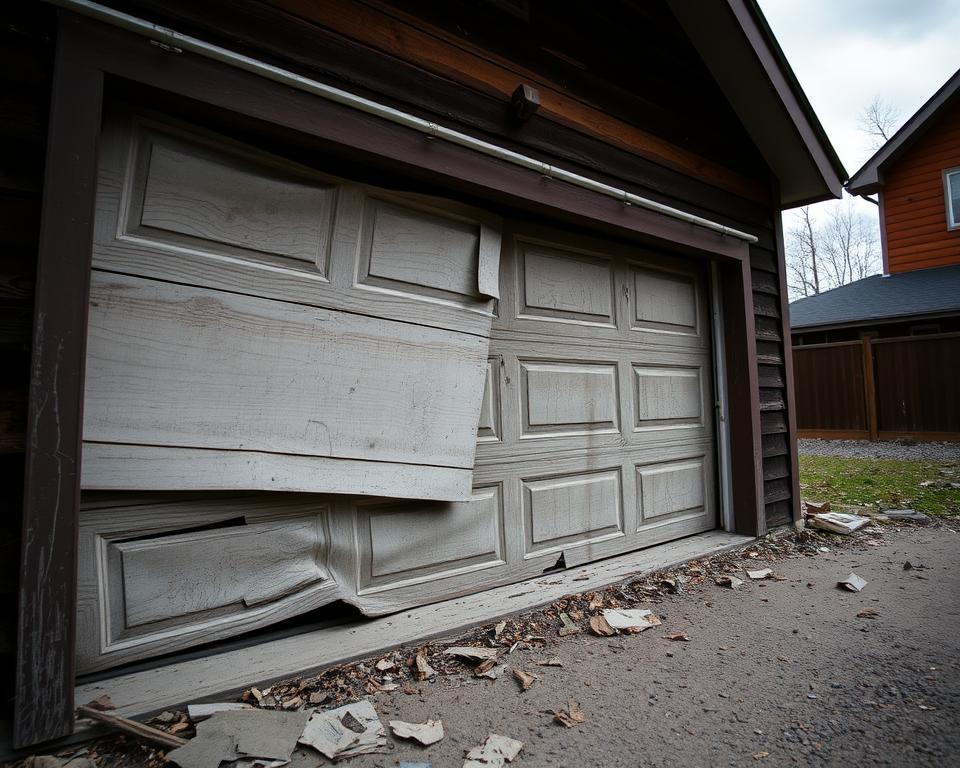
Filing a Claim for Garage Door Damage
Filing a claim for garage door damage is important. We help you navigate the insurance claim process well. First, check your home insurance policy to see if the damage is covered. Your policy will tell you if garage door repairs are included, usually for damage from natural disasters.
Follow your insurance provider’s instructions for the claim process. This means documenting the damage, getting repair estimates, and submitting paperwork. Knowing what’s covered and what’s not is key. Wear and tear is often not covered. Being informed helps you use your policy to get repairs done.
- Reviewing your policy to understand the coverage and exclusions
- Documenting the damage with photos and videos
- Obtaining estimates from licensed contractors for repairs
- Submitting the claim and supporting documents to the insurance provider
By following these steps, you can make sure your garage door repairs are covered and done right.
Cost Considerations and Insurance Deductibles
When we file a claim for garage door damage, we must think about the costs. Knowing our insurance limits and what’s covered is key. A common deductible is $1,000, which might make small repairs not worth claiming.
Before deciding to claim or pay ourselves, we should check if the repair costs more than our deductible. For example, if fixing a garage door costs $1,500, we get $500 after the deductible. It’s important to remember that insurance might only cover the garage door’s current value, not its full cost.
Factors Affecting Claim Eligibility
- Detached garages are often not covered by homeowner policies, affecting about 20% of claims.
- Intentional damage is not covered, but accidental damage by the homeowner usually is.
- Costs for routine maintenance, like fixing photo sensors or replacing motors, aren’t covered by insurance.
Knowing these details helps us decide wisely about filing claims. It’s also good to document damage with photos or videos. This way, we can make a strong insurance claim. We should think about the costs and benefits of claiming, including how it might affect our premiums and what we have to pay ourselves.
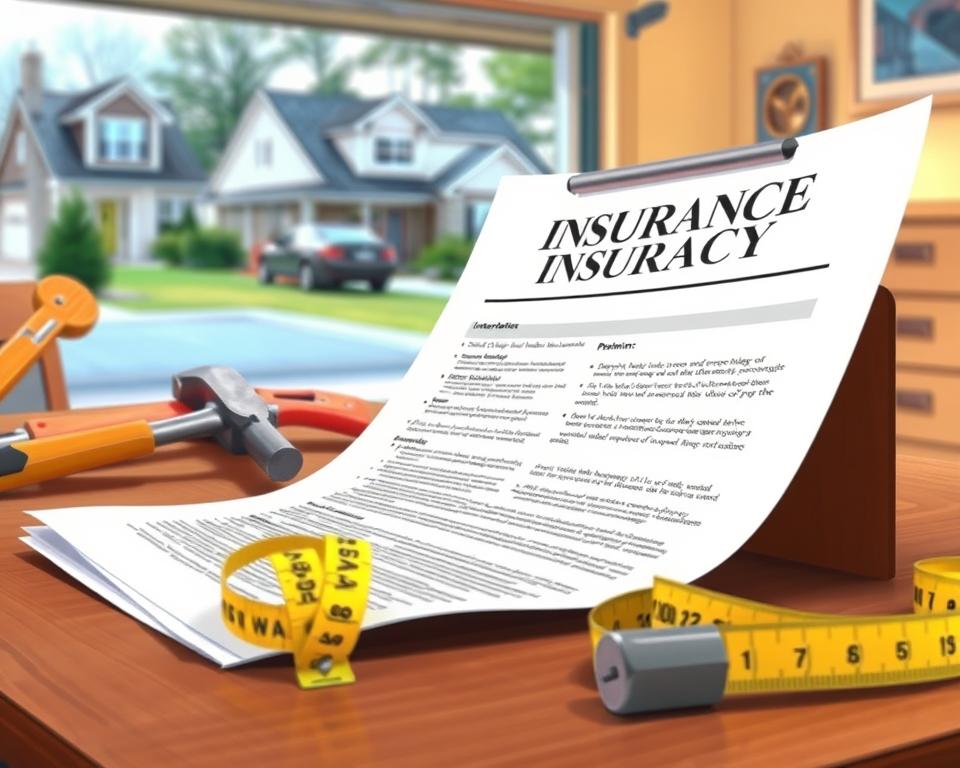
Preventing Garage Door Damage and Maintaining Coverage
We know how key regular maintenance is for our garage doors. It helps them last longer and cuts down on garage door repairs. By doing routine checks and upkeep, we can avoid damage. This means lubricating parts, checking springs and cables, and swapping out old parts.
It’s also important to keep good records. These can help us with our insurance claim process if damage happens. We should review our policy to know what’s covered and what’s not. And we need to follow any special rules for keeping coverage.
Here are some ways to stop garage door damage:
- Regularly check the door and its parts for wear and tear signs
- Keep the door and area around it clean and free of debris
- Don’t overload the door with too much weight or use it too much
By following these tips and keeping up with maintenance, we can avoid damage. This keeps our garage door coverage active. It gives us peace of mind and financial safety in case of unexpected damage or repairs.
Protecting Your Investment: Smart Steps for Garage Door Security
Understanding your homeowners insurance policy for garage door coverage is key. But, protecting your investment is more than just insurance. By taking steps to improve your garage door’s security, you can lower the risk of damage or theft. This might even help you get better insurance rates.
Using smart garage door tech, like real-time monitoring and remote access, boosts your home’s security. This can lead to lower insurance costs. Choosing a steel garage door over wood not only improves fire safety but can also lower your home insurance policy costs. Regular checks and maintenance can also make your garage door last longer, keeping it in good shape and reducing risks for your property damage coverage.
A well-kept and secure garage door protects your investment and boosts your home’s value. By following these smart steps, you’ll have more peace of mind. You might also get better insurance rates for your property.

